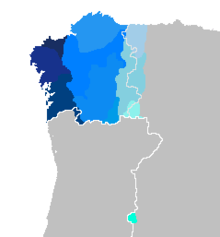
Back Galicies Afrikaans ጋሊስኛ Amharic Idioma gallego AN Galicisc sprǣc ANG اللغة الجليقية Arabic جاليجو ARZ Idioma gallegu AST Галис мацӀ AV Qalisiya dili Azerbaijani قالیسی دیلی AZB
| Galician | |
|---|---|
| galego | |
| Pronunciation | [ɡaˈleɣʊ] |
| Region | Galicia and adjacent areas in Asturias and Castile and León |
| Ethnicity | Galician |
Native speakers | 2.4 million (2012)[1] 58% of the population of Galicia (c. 1.56 million) are L1 speakers (2007)[2] |
Early form | |
| Galician alphabet (Latin script) Galician Braille | |
| Official status | |
Official language in | Galicia (Spain) Official regional language. Decades of development as language of literature, including poetry and essays for all levels of education. Growing sense of ethnic identity.[3] |
| Regulated by | Royal Galician Academy |
| Language codes | |
| ISO 639-1 | gl |
| ISO 639-2 | glg |
| ISO 639-3 | glg |
| Glottolog | gali1258 |
| Linguasphere | 51-AAA-ab |
 Distribution of the various dialects of Galician in Spain and the extreme north of Portugal. | |
Galician (Galician: Galego) is a modern language that is spoken in Galicia, a region of Spain in the northwest of the Iberian Peninsula. Galician is closely related to Portuguese because they split from the same language, which is now called Galician-Portuguese or Medieval Galician. Some even say that Galician and Portuguese are two dialects of the same language but with different accents. However, most scholars say that the differences are now so great since both languages separated in the Middle Ages that they are now truly different languages. Galician is also very similar to the Leonese language.
Galician is a Romance language that evolved from Vulgar Latin, the Latin of common people in the medieval Kingdom of Galicia after the fall of the Western Roman Empire. The area is now Galicia, the western parts of Asturias and Castile-Leon and the Norte region in northern Portugal.
Galician took most of its words from Latin, many from Judeo-Spanish but some from Germanic and Celtic.
Galician comes from Galician-Portuguese, spoken during the Middle Ages in the medieval Kingdom of Galicia. Today, Galician is spoken only in Galicia and by some people in North America, South America and Eastern Europe. In Jalisco, Mexico, Galician still leaves traces in the accent and words.
- ↑ Galician at Ethnologue (18th ed., 2015)
- ↑ "Observatorio da Lingua Galega". Observatorio da Lingua Galega. Archived from the original on 22 August 2013. Retrieved 17 October 2015.
- ↑ "Ethnologue report for language code: glg". Archive.ethnologue.com. Archived from the original on 4 January 2015. Retrieved 17 October 2015.